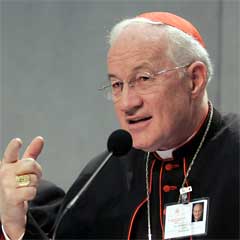At a joint news conference in Quebec City with Ottawa Archbishop Terrance Prendergast, Ouellet called for the federal government to provide funding for pro-life organizations that counsel women against abortion.
“Governments are funding clinics for abortion,” Oullet said. “I would like equity for organizations that are defending life. If we had equity in funding I think we would make lots of progress in Canada.
“I am calling for a campaign of awareness and for programs to help women in distress. There is a lack of information, accompaniment and financial aid for pregnant women in crisis situations to make an enlightened choice.”
Ouelett's earlier comments on abortion drew condemnation from federal and provincial politicians, culminating in a unanimous resolution May 19 in the Quebec National Assembly that affirmed a woman’s right to free abortion, and also demanded the federal government end its ambiguity on the issue and stop de-funding to women’s organizations.
Ouellet was taken aback by the uproar but refuses to be intimidated.
“The abortion debate is on and we must not be afraid of it. We must have it, even if there is a motion in Quebec and an affirmation by the Prime Minister in Ottawa that go in the opposite direction and refuse to reopen legislation on abortion.”
Earlier in the week, Ouellet expressed dismay at the visceral public reaction to his pro-life comments.
“I have no power,” said the Archbishop of Quebec and Primate of Canada. “The church in Quebec has no power anymore. Why such a big reaction? I am just reminding people of the teaching of the Church.”
The cardinal defended the legitimacy of Church leaders to speak publicly on abortion.
“The Church has to teach truth of the Gospel and the understanding of the human being from the Gospel of Christ,” he said. “And the Church has to care for the formation of conscience.”
There are about 30,000 abortions a year in Quebec and about 100,000 in Canada as a whole. Ouellet reiterated that the teaching of the Church on abortion is that it is “considered a crime, a moral crime and a legal crime, too, and the Church is asking the states to penalize the practice of abortion.”
The cardinal seemed saddened that he has been accused of condemning women.
“I did not condemn any woman who has had recourse to an abortion,” he said. “God alone is the judge of everybody's conscience because he alone can measure all the elements in each and every case.”
“My objective was to remind (people) of the enormous moral objective with the preoccupation of saving a child's innocent life and saving the mother from the serious consequences of a deliberately provoked abortion.”
Oullet said the consequences of abortion are difficult for women, even if those consequences are not commonly recognized.
“We should do much more at the social level and even the government level for helping women, for removing the causes of recourse to abortion,” he said.
Abortion is a painful decision for women who are in crisis, said Ouellet.
“They are distressed, it is a very difficult decision to take. We should be more sensitive to all the factors that are bringing them to this decision.”
With files from Carolyn Girard


 OTTAWA (CCN) — Cardinal Marc Ouellet has vowed not to be silenced on the “crime” of abortion and has answered his critics by demanding federal government funding to assist pregnant women.
OTTAWA (CCN) — Cardinal Marc Ouellet has vowed not to be silenced on the “crime” of abortion and has answered his critics by demanding federal government funding to assist pregnant women.